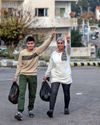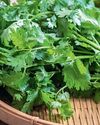
IN A HOTEL CONFERENCE ROOM IN SHROPSHIRE LAST WINTER, a group of people clustered by the coffee machine. Others were just coming in, undoing scarves and coats, most in branded sweatshirts or fleece gilets. Families scattered and bunched, finding others they knew, holding their cups awkwardly and sharing out croissants. Heather Wildman, the host, moved from group to group, making introductions: an arable contractor to a vineyard manager, a poultry farmer to a cheesemaker. The mood was subdued and a little apprehensive. Everyone stood by the edges of the room, watching the food and the door.
Wildman positioned herself at the front, offered more tea, thanked everyone for taking the time, knew it was difficult with production schedules and school runs. She is 50, with a ready, open smile. Her introduction was friendly, practised, and self-deprecating. She explained what the day would hold and made clear that she was not from the ministry, the Environment Agency or HMRC, that she was not an accountant, a lawyer, a snitch or a nark. "None of that," she said. "I'm a farmer, and I help people." Wildman is one of a very rare British breed. She describes herself as a succession facilitator - a role combining professional consultancy, financial advice, legal mediation, succession planning and life coaching to people working in agriculture: a farm-business counsellor, if you like. She works to unknot the snags of identity and inheritance, using group meetings and individual sessions to help farmers work out the easy questions ("Who's doing the soil sampling?") and the hard ones ("Do your children really want to inherit this business?").
Diese Geschichte stammt aus der January 19, 2024-Ausgabe von The Guardian Weekly.
Starten Sie Ihre 7-tägige kostenlose Testversion von Magzter GOLD, um auf Tausende kuratierte Premium-Storys sowie über 8.000 Zeitschriften und Zeitungen zuzugreifen.
Bereits Abonnent ? Anmelden
Diese Geschichte stammt aus der January 19, 2024-Ausgabe von The Guardian Weekly.
Starten Sie Ihre 7-tägige kostenlose Testversion von Magzter GOLD, um auf Tausende kuratierte Premium-Storys sowie über 8.000 Zeitschriften und Zeitungen zuzugreifen.
Bereits Abonnent? Anmelden

Votes of confidence
From India to Venezuela and Senegal to the US, more people voted this year than ever before, with over 80 elections across the world. With rising authoritarianism and citizen-led resistance revealing its vulnerabilities and resilience in the face of unprecedented challenges, has democracy reached its breaking or turning point?

Out of touch How president sealed his own fate in martial law gambit
For Yoon Suk Yeol, this month's short-lived martial law declaration wasn't just a catastrophic miscalculation - it was the culmination of a presidency that had been troubled from the start.

Son of the soil Who is François Bayrou, the farmer turned prime minister?
François Bayrou, the new French prime minister, calls himself a country man. A tractor-driving \"son of the soil\" and breeder of thoroughbreds, he has run for president three times, saying his rural roots and centrist politics led him to try to find common ground between left and right.

Power plant workers keeping the lights on
The Guardian Weekly visits a Soviet-era coal-fired thermal installation to learn how it has held up to Russian attacks

Prince charmed Alleged spy scandal may have exposed China threat
Prince Andrew should be commended for doing Britain a great service, according to longstanding China watcher Charles Parton. The now marginalised royal has, the analyst observed, \"almost single handedly\" succeeded \"in highlighting the threat to free and open countries\" posed by the contemporary Chinese state.

In Moscow, a new life of secluded irrelevance awaits Assad
He was whisked away without a last message to his people, the aircraft's transponder deliberately switched off to avoid detection as it departed from an airbase in Syria.

'We fear new oppression' Alawites worry over rebel rule
To prepare khubeiza, the leaves of the kale-like plant must be roughly chopped and sauteed with onions, garlic and a dash of salt. According to folklore, the recipe originated among the Alawite communities who lived in Syria's mountainous coastline where the fibrous, wild-growing plant can be found in abundance. So poor were the Alawites in Ottoman times, the story goes, that the only food they could find to eat was khubeiza, which sprouts like a stubborn weed every spring.

'Gisèle is waiting for explanations'
The Pelicot rape trial has horrified the world. But as it comes to an end, the questions it has raised about French society and rape culture have still not been answered.

FROM DOCTOR TO BRUTAL DICTATOR THE RISE AND FALL OF ASSAD
0N THE FACE OF IT AT LEAST, the Bashar al-Assad of 2002 presented a starkly different figure from the brutal autocrat he would become, presiding over a fragile state founded on torture, imprisonment and industrial murder.

What fresh alternatives can be used to placate coriander haters?
Everyone knows a hater of coriander - also known as cilantro - who won't go near the stuff. Itamar Srulovich, however, is not one: \"I adore fresh coriander, and always have,\" says the chef/co-owner of the Honey & Co group in London.